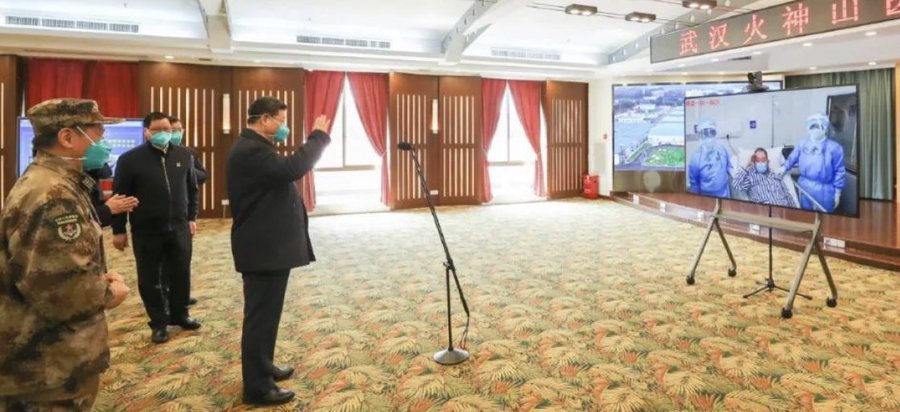As coronavirus goes global, China’s Xi asserts victory on first trip to Wuhan since outbreak
March 10, 2020 at 8:29 p.m. GMT+11
“Xi Jinping has been concerned about the epidemic situation in Wuhan,” the official Xinhua News Agency wrote Tuesday, describing how he had “always personally directed” the response and that his “heart resonates” with the people.
Swaths of Hubei were locked down Jan. 23 as authorities tried to contain the virus. As the restrictions became more draconian, Wuhan residents were banned from leaving their homes.
Downward trends in China’s epidemic statistics suggest that effort has been effective, but not before the virus infected more than 80,000 people and killed 3,140 in China and spread to dozens of other countries.
Italy, South Korea and Iran have been especially hard-hit, with Italy enforcing a nationwide lockdown. Global markets have tumbled to their lowest levels in a more than a decade, and economists are predicting a global recession.
But in China, none of this is being blamed on Communist leaders’ initially slow response. Experts say the epidemic would have been more manageable if the authorities had responded in early January, when the outbreak’s severity became clear, rather than toward the month’s end.
“In the past week the propaganda has really been ramping up, highlighting the dwindling new infections and contrasting that with the rising infection rate overseas,” said Yun Jiang, a former Australian government official who now co-edits the China Neican blog. “They’re trying to tell a positive story about China’s and the Communist Party’s management of the situation.”
Bill Bishop, publisher of the influential Sinocism newsletter, had listed a Xi visit to Wuhan as one of three “unmistakable signs the party thinks victory really is at hand.” The other two were the announcement of a new date for the postponed “Two Sessions” political meetings, and the reopening of schools shuttered since early February.
This effort to recast the narrative appears to be working in many cases, not least because the party tightly controls the Internet. Both Jiang and Bishop report family members in China telling them to go there because it was too dangerous in Australia and the United States, respectively.
“It’s time to ‘pick the peaches’ and prove to the world that China has effectively controlled the outbreak,” said Zhang Lifan, an independent historian in Beijing, describing a new phase in the party’s telling of its virus story. “Now the overall publicity strategy is … to promote China as the global leader in fighting against the epidemic.”
China reported only 19 new cases of coronavirus Tuesday, including 17 in Hubei. State media has featured numerous reports about “cabin hospitals” — quarantine centers built in stadiums to isolate the infected — closing because they are no longer needed, and of the heroic sacrifices of medical staff. Airwaves and newspaper pages have portrayed Xi as leading a “people’s war” against the virus.
But through the course of the epidemic until Tuesday, Xi had not visited Hubei, instead sending the premier, Li Keqiang, in the early days and Vice Premier Sun Chunlan more recently. On a walk through Wuhan apartment complexes last week, residents went onto their balconies to shout “Fake, it’s all fake!” toward Sun, according to videos posted on Twitter.
On Tuesday, Xi visited medical workers and patients, military officers and soldiers, community workers and police officers in Wuhan, according to Xinhua.
His first stop was the Huoshenshan hospital facility, which was built in 10 days. He “learned about the hospital’s operations, treatment of patients, protection for medical workers and scientific research there,” Xinhua reported. State media said he visited patients, but photos showed him standing before a huge screen, talking to them by video link.
This is apparently Xi Jinping's idea of "visiting" coronavirus patients at the Huoshenshan hospital in Wuhan finance.sina.com.cn/china/gncj/202…
495 people are talking about this
He then visited people stuck in their apartments in Wuhan. People posted photos on social media showing police officers sitting on the balconies, saying two officers had been dispatched to each apartment to ensure residents did not yell at Xi. The images could not be independently verified.
In recent weeks China’s Internet has lit up with public criticism and calls for more freedom unseen in Xi’s seven years in power. Although these posts were deleted by censors, the outpouring showed how Xi was facing an unprecedented political crisis.
“He is trying to repair the damage,” said Minxin Pei, a professor specializing in Chinese politics at Claremont McKenna College in California. “Now, things are getting better and he wants to show that his leadership has been successful.”
Alarmed at the epidemic’s impact on China’s slowing economy, Xi has been prodding businesses to reopen.
Hubei is considering allowing people in medium- or low-risk areas to resume traveling, the official Hubei Daily reported Tuesday. They would have to use a code that requires users to submit health information on their phones and receive a “green” rating before they can enter stores or board public transportation.
The party’s effort to rewrite the narrative of China’s coronavirus outbreak involves exaggerating or playing up other countries’ failures, especially in the West, said Pei. “The messaging is that we should see the West’s response as bumbling and incompetent,” he said.
Chinese officials have amplified these efforts by suggesting that the coronavirus might have originated in the United States, and by criticizing Secretary of State Mike Pompeo’s description of the virus as the “Wuhan virus.”
Hu Xijin, the editor of the nationalist Global Times newspaper, criticized as “seriously misleading” the Centers for Disease Control and Prevention advice that people don’t need to wear surgical masks unless they are sick.
“All of the Chinese experts have advised people to wear face mask when in contact with others during time of epidemic and consider it one of the most effective measures,” he wrote on Twitter. “Please heed suggestion of Chinese experts.”




No comments:
Post a Comment